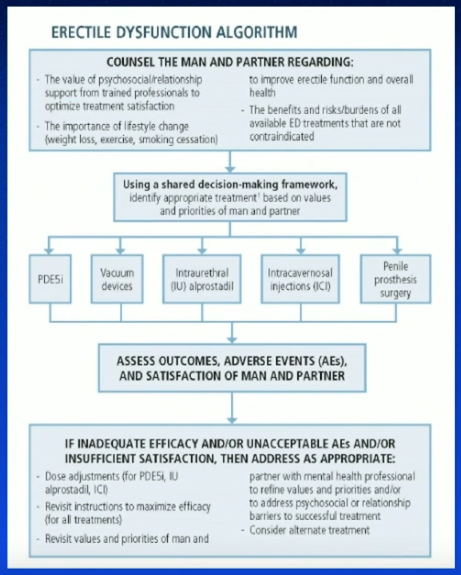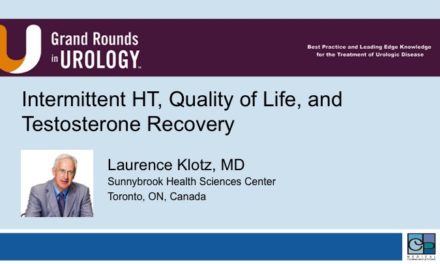Mohit Khera, MD, MBA, MPH presented “Update on 2018 AUA Testosterone and ED Guidelines” during the 23rd Annual Innovations in Urologic Practice on September 14, 2018 in Santa Fe, New Mexico.
How to cite: Khera, Mohit. “Update on 2018 AUA Testosterone and ED Guidelines” September 14, 2018. Accessed Dec 2024. https://dev.grandroundsinurology.com/update-on-2018-aua-testosterone-and-ed-guidelines/
Update on 2018 AUA Testosterone and ED Guidelines – Summary:
Mohit Khera, MD, MBA, MPH, introduces the 2018 American Urological Association (AUA) guidelines for testosterone therapy and erectile dysfunction. He also describes inconsistencies between these guidelines and various institutions’ statements regarding these clinical areas.
Abstract:
In 2018, the AUA released their first testosterone therapy (TTh) guidelines, as well as for erectile dysfunction as a third iteration. Notably, the TTh guidelines recommend not to measure patients’ serum testosterone without signs and symptoms of hypogonadism, but with exceptions for select populations. The guidelines also recommend annual PSA testing for individuals over 40 and a normal testosterone level range of 450-600. For natural testosterone boosters, clinicians may use aromatase inhibitors, human chorionic gonadotropin, selective estrogen receptor modulators, or a combination for men desiring to maintain fertility.
There are controversies associated with the release of the 2018 guidelines due to differing perspectives from other organizations. Specifically, the FDA, the Endocrine Society, and AUA have contradicting statements regarding venous thromboembolism and cardiovascular disease (CVD). However, a review of all articles from 1940-2014 relating to testosterone and CVD and a similar study reviewing articles from 2014 to 2017 corroborate the AUA statements. In 2015, the FDA label eliminated idiopathic hypogonadism from its indications for TTh, contradicting with AUA and Endocrine Society guidelines. Additionally, there are similar controversies involving testosterone and its impact on BPH and prostate cancer.
The 2018 AUA guidelines concerning erectile dysfunction have a strong emphasis on shared decision making. Past guidelines have recommended that clinicians prescribe first- and second-line therapies before considering surgical interventions. Conversely, the new guidelines recommend counseling patients and basing treatment decisions on their values and priorities. The new guidelines also account for emerging techniques in this setting. In this regard, the AUA defines stem cell therapy, low-intensity shock wave therapy, and platelet rich plasma are experimental.
About Innovations in Urologic Practice
Innovations in Urologic Practice (IUP) is an annual CME-accredited conference devoted to updating urologists on the rapidly changing healthcare environment. Topics focus on innovative diagnostic and treatment strategies, controversies, new and currently developing technologies, and challenges in today’s urologic practice. Dr. Khera presented this lecture during the 23rd IUP in 2018. Please visit this page in order to learn more about future IUP meetings.
ABOUT THE AUTHOR
Mohit Khera, MD, MBA, MPH, is the Professor of Urology and Director of the Laboratory for Andrology Research at the McNair Medical Institute at Baylor College of Medicine. He is also the Medical Director of the Executive Health Program at Baylor. Dr. Khera earned his undergraduate degree at Vanderbilt University. He subsequently earned his Masters in Business Administration and his Masters in Public Health from Boston University. He received his MD from The University of Texas Medical School at San Antonio and completed his residency training in the Scott Department of Urology at Baylor College of Medicine. He then went on to complete a one-year Fellowship in Male Reproductive Medicine and Surgery with Dr. Larry I. Lipshultz, also at Baylor.
Dr. Khera specializes in male infertility, male and female sexual dysfunction, and declining testosterone levels in aging men. Dr. Khera’s research focuses on the efficacy of botulinum toxin type A in treating Peyronie’s disease, as well as genetic and epigenetic studies on post-finasteride syndrome patients and testosterone replacement therapy.
Dr. Khera is a widely published writer. He has co-authored numerous book chapters, including those for the acclaimed Campbell-Walsh Urology textbook, for Clinical Gynecology, and for the fourth edition of Infertility in the Male. He also co-edited the third edition of the popular book Urology and the Primary Care Practitioner. In 2014, he published his second book Recoupling: A Couple’s 4 Step Guide to Greater Intimacy and Better Sex. Dr. Khera has published over 90 articles in scientific journals and has given numerous lectures throughout the world on testosterone replacement therapy and sexual dysfunction. He is a member of the Sexual Medicine Society of North America, the American Urological Association, and the American Medical Association, among others.






